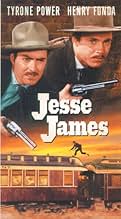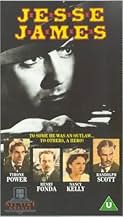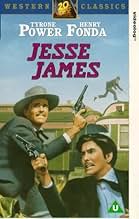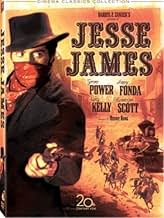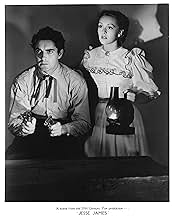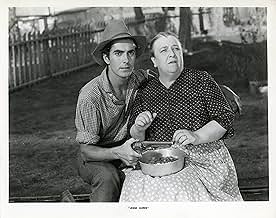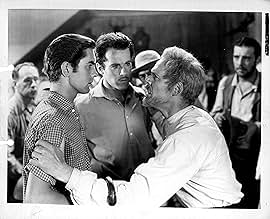NOTE IMDb
7,0/10
5,2 k
MA NOTE
Après que des agents des chemins de fer aient expulsé de force la famille James de leur ferme familiale, Jesse et Frank se tournent vers le banditisme pour se venger.Après que des agents des chemins de fer aient expulsé de force la famille James de leur ferme familiale, Jesse et Frank se tournent vers le banditisme pour se venger.Après que des agents des chemins de fer aient expulsé de force la famille James de leur ferme familiale, Jesse et Frank se tournent vers le banditisme pour se venger.
- Réalisation
- Scénario
- Casting principal
Johnny Russell
- Jesse James Jr.
- (as John Russell)
Avis à la une
With Ty Power and Hank Fonda in the saddle, there was no way this version of the James Brothers legend was going to paint them as bad guys.
Less so since the courtly southerner Nunnally Johnson wrote and produced the yarn. In reality the James boys took to knocking off banks and trains after being at a loose end following Missouri's joining the losing side in the War Between the States. This was too painful a scab to pick in the Thirties, so Johnson gives the Jameses a more palatable enemy than Abe Lincoln: big bad railroad barons upsetting their ma. And he paints his outlaws with a populist tint, to please New Deal Democrats as well as Dixiecrats who knew the real backstory.
However, the broad outlines of their rise and fall are intact. We see a gradual slide into semi-chivalrous villainy (they didn't rob train passengers, only mails), a 'Liberty Valance'-like exploitation of their coups by political orators and editors, Jesse's becoming consumed by his own legend, and the final botched bank job at Northfield, Minnesota. That leads to a panicky flight and an attempt to live semi-respectably under pseudonyms, followed by Bob Ford's betrayal as Jesse turns art curator.
The film is pleasingly quiet between action set pieces, free of the obtrusive music that was often the curse of Hollywood soundtracks and laced with good lines from Johnson's florid pen. And above all, surrounded by good character actors, we have two rising Zanuck stars tussling enjoyably for mastery, both in the plot and career-wise.
Henry King had become Power's preferred handler ('In Old Chicago' the previous year had been a wow) and both men evidently relish the challenge of tweaking his 'nice bank teller' image a little. Swarthy and bearded betimes, barking out orders to older subordinates, Power does fine. Fonda's grand remonstrance, when he tells Junior that he's turning into a suicidal psycho, is ably played and paced. The soft early tripack Technicolor looks sweet both outdoors-- Ford was getting similar results in 'Drums Along the Mohawk'-- and in candle-lit interiors.
Also noteworthy is Jesse's respectful, confiding relationship with his black ex-slave Pinky (Ernest Whitman) when he decides not to pursue Frank. Black maids could sass their mistresses in crazy comedies, but this quality of understanding between men of different colours was unusual in early-talkie Hollywood.
'Jesse James' was released in Hollywood's peak year, 1939. It's understandable that it was overlooked. But when we've done finger-wagging at the cruelty to horses which led the American Humane Association to demand supervisory privileges over stampedes-- and the cruelty to female Central Casting members which allowed Power to father a child on one-- we can still appreciate a good, workmanlike travesty of outlaw history. As a distortion of the James-Younger saga it has not been surpassed.
Less so since the courtly southerner Nunnally Johnson wrote and produced the yarn. In reality the James boys took to knocking off banks and trains after being at a loose end following Missouri's joining the losing side in the War Between the States. This was too painful a scab to pick in the Thirties, so Johnson gives the Jameses a more palatable enemy than Abe Lincoln: big bad railroad barons upsetting their ma. And he paints his outlaws with a populist tint, to please New Deal Democrats as well as Dixiecrats who knew the real backstory.
However, the broad outlines of their rise and fall are intact. We see a gradual slide into semi-chivalrous villainy (they didn't rob train passengers, only mails), a 'Liberty Valance'-like exploitation of their coups by political orators and editors, Jesse's becoming consumed by his own legend, and the final botched bank job at Northfield, Minnesota. That leads to a panicky flight and an attempt to live semi-respectably under pseudonyms, followed by Bob Ford's betrayal as Jesse turns art curator.
The film is pleasingly quiet between action set pieces, free of the obtrusive music that was often the curse of Hollywood soundtracks and laced with good lines from Johnson's florid pen. And above all, surrounded by good character actors, we have two rising Zanuck stars tussling enjoyably for mastery, both in the plot and career-wise.
Henry King had become Power's preferred handler ('In Old Chicago' the previous year had been a wow) and both men evidently relish the challenge of tweaking his 'nice bank teller' image a little. Swarthy and bearded betimes, barking out orders to older subordinates, Power does fine. Fonda's grand remonstrance, when he tells Junior that he's turning into a suicidal psycho, is ably played and paced. The soft early tripack Technicolor looks sweet both outdoors-- Ford was getting similar results in 'Drums Along the Mohawk'-- and in candle-lit interiors.
Also noteworthy is Jesse's respectful, confiding relationship with his black ex-slave Pinky (Ernest Whitman) when he decides not to pursue Frank. Black maids could sass their mistresses in crazy comedies, but this quality of understanding between men of different colours was unusual in early-talkie Hollywood.
'Jesse James' was released in Hollywood's peak year, 1939. It's understandable that it was overlooked. But when we've done finger-wagging at the cruelty to horses which led the American Humane Association to demand supervisory privileges over stampedes-- and the cruelty to female Central Casting members which allowed Power to father a child on one-- we can still appreciate a good, workmanlike travesty of outlaw history. As a distortion of the James-Younger saga it has not been surpassed.
Splendid in his first Western and his first Technicolor movie, Power portrayed Jesse James as a sympathetic hero and the most charming bank robber of the Old West
Teamed with Henry Fonda, and stalwart Randolph Scott, Henry King came with a Western classic, considered as one the best Jesse James of the series
The film opens in Pineville with hothead Jesse and temperate Frank as a couple of Missouri brothers who, embittered by the ruthless tactics of a railroad agent, got a warrant and had to skip out, hiding out until Major Rufus Cobb (Henry Hull) can get the governor to give them a fair trial But the railroad's got too much at stake to let two farmer boys bollix things up
After they had thrown Barshee (Brian Donlevy), the brutal railroad representative off the farm of their widowed mother (Jane Darwell) when she refused to sign over her property, Jesse and Frank later learn that she had been killed by a bomb tossed into their home by Barshee himself Jesse returns, shoots Barshee, and vows revenge on the railroad, with the complete sympathy of the Missouri populace
Jesse's sweetheart, Zee and her uncle, publisher Major Rufus, are among the James' supporters, as is U. S. Marshal Will Wright (Scott), but he has a job to do and is forced to track down the two brothers
Jesse and Frank have expanded their operation from merely harassing the St. Louis Midland with a series of holdups to robbing banks
Pursuaded by railroad president McCoy (Donald Meek) to talk Jesse into surrendering, Wright extracts a written promise of a light sentence for the desperado Zee then urges Jesse to give himself up following their wedding
Of course, Henry King tries to show how Jesse hated the railroads and from that hate he presented a charismatic hero But this hero was not going to last The more luck he had, the worse he gets It'll be his appetite for shooting and robbing until something happens to him
He also shows a worried fiancée keeping thinking of an outlaw all the time out there in the hills just going on and on to nowhere just trying to keep alive with everybody after him, wanting to kill him to get that money
There's a scene near the end where Zee (Nancy Kelly) after delivering her baby is lying in bed with her creature, with the presence of the Marshal, so to speak, between herself and her uncle that suddenly made clear to me what the entire film was about Her feelings as a woman: "I'm so tired to care. This is the way it always is. We live like animals, scared animals. We move. We hide. We don't dare to go out "
Obviously she is a sensitive woman who exposes her being on screen without losing sight of reality That's quite a great scene from King, and key in this great Western, as it's really all about her character, Zee Cobb, a struggling woman in love now a mother with a baby to take care of
So please don't miss it!
Teamed with Henry Fonda, and stalwart Randolph Scott, Henry King came with a Western classic, considered as one the best Jesse James of the series
The film opens in Pineville with hothead Jesse and temperate Frank as a couple of Missouri brothers who, embittered by the ruthless tactics of a railroad agent, got a warrant and had to skip out, hiding out until Major Rufus Cobb (Henry Hull) can get the governor to give them a fair trial But the railroad's got too much at stake to let two farmer boys bollix things up
After they had thrown Barshee (Brian Donlevy), the brutal railroad representative off the farm of their widowed mother (Jane Darwell) when she refused to sign over her property, Jesse and Frank later learn that she had been killed by a bomb tossed into their home by Barshee himself Jesse returns, shoots Barshee, and vows revenge on the railroad, with the complete sympathy of the Missouri populace
Jesse's sweetheart, Zee and her uncle, publisher Major Rufus, are among the James' supporters, as is U. S. Marshal Will Wright (Scott), but he has a job to do and is forced to track down the two brothers
Jesse and Frank have expanded their operation from merely harassing the St. Louis Midland with a series of holdups to robbing banks
Pursuaded by railroad president McCoy (Donald Meek) to talk Jesse into surrendering, Wright extracts a written promise of a light sentence for the desperado Zee then urges Jesse to give himself up following their wedding
Of course, Henry King tries to show how Jesse hated the railroads and from that hate he presented a charismatic hero But this hero was not going to last The more luck he had, the worse he gets It'll be his appetite for shooting and robbing until something happens to him
He also shows a worried fiancée keeping thinking of an outlaw all the time out there in the hills just going on and on to nowhere just trying to keep alive with everybody after him, wanting to kill him to get that money
There's a scene near the end where Zee (Nancy Kelly) after delivering her baby is lying in bed with her creature, with the presence of the Marshal, so to speak, between herself and her uncle that suddenly made clear to me what the entire film was about Her feelings as a woman: "I'm so tired to care. This is the way it always is. We live like animals, scared animals. We move. We hide. We don't dare to go out "
Obviously she is a sensitive woman who exposes her being on screen without losing sight of reality That's quite a great scene from King, and key in this great Western, as it's really all about her character, Zee Cobb, a struggling woman in love now a mother with a baby to take care of
So please don't miss it!
Of all the films Hollywood made during the golden years, my least favorite were ones that played very fast and loose with the facts about the Old West. And, of all the Westerns, those about Jesse James as well as the gunfight at the OK Corral are the worst. Think of it from my point of view. I am an American history teacher and for some bizarre reason, I like my historical films to actually bear some semblance to what actually occurred!!
JESSE JAMES, like all these other films, is a historical nightmare from start to finish. The life of this evil killer and thief is practically impossible to discern in this silly but entertaining film from 20th Century-Fox Studios. Instead of a bad man, according to the film, he is unfairly pushed to a life of crime by an evil railroad AND he and his brother, Frank, are good boys at heart!! With such stupid revisionism, we should soon expect to see films where Hitler, Lee Harvey Oswald and Jeffrey Dahmer are heroes!! There are tons more mistakes about the characters--but simply too many to bother mentioning. In fact, what is NOT wrong would be quicker and easier to discuss!! Additionally, there are just every cliché known to Westerns, such as the shootout ("count three and fire"), Frank giving the town an ultimatum to give him back Jesse by midnight "or else", happy and intensely loyal Black servants, the Robin Hood-like quality of the gang (though at least they showed how eventually he became more of a hardened criminal), the death of Frank and Jesse's momma pushing them to crime, Henry Hull's character from start to finish as well as his comments like "Jesse played fair" and "he was one of the gol-dangedest gol-darnestest buckaroos"!
As for the non-historical aspects of the film, there is a lot to like. The film is shot in glorious Technicolor and the camera work is incredible. I especially loved the extremely difficult shot of the nighttime raid on the train--the moving external shot was NOT an easy thing to do and it looked great. Additionally, being an A-picture from the studio, the cast was spectacular--Tyrone Power (Jesse), Henry Fonda (Frank), Henry Hull (playing a role much like you might expect Walter Brennan to usually play), Randolph Scott, Jane Darwell, Donald Meek and Brian Donlevy make for an excellent cast. And, I must admit the film was fun to watch if you could care less about the facts and just want to be entertained. Unfortunately, for folks like me, it's a chore to watch even a well-made film if it's so historically inaccurate.
By the way, it should also be mentioned that according to the IMDb trivia section, this film should be remembered for its total disregard for the welfare of the horses during filming. In exciting scenes, horses actually died to make the shots look good and although I am NOT a bleeding-heart, I just can't help but be appalled with this disregard for the animals. Not surprisingly, this film led to changes in the industry to protect animals in future films.
JESSE JAMES, like all these other films, is a historical nightmare from start to finish. The life of this evil killer and thief is practically impossible to discern in this silly but entertaining film from 20th Century-Fox Studios. Instead of a bad man, according to the film, he is unfairly pushed to a life of crime by an evil railroad AND he and his brother, Frank, are good boys at heart!! With such stupid revisionism, we should soon expect to see films where Hitler, Lee Harvey Oswald and Jeffrey Dahmer are heroes!! There are tons more mistakes about the characters--but simply too many to bother mentioning. In fact, what is NOT wrong would be quicker and easier to discuss!! Additionally, there are just every cliché known to Westerns, such as the shootout ("count three and fire"), Frank giving the town an ultimatum to give him back Jesse by midnight "or else", happy and intensely loyal Black servants, the Robin Hood-like quality of the gang (though at least they showed how eventually he became more of a hardened criminal), the death of Frank and Jesse's momma pushing them to crime, Henry Hull's character from start to finish as well as his comments like "Jesse played fair" and "he was one of the gol-dangedest gol-darnestest buckaroos"!
As for the non-historical aspects of the film, there is a lot to like. The film is shot in glorious Technicolor and the camera work is incredible. I especially loved the extremely difficult shot of the nighttime raid on the train--the moving external shot was NOT an easy thing to do and it looked great. Additionally, being an A-picture from the studio, the cast was spectacular--Tyrone Power (Jesse), Henry Fonda (Frank), Henry Hull (playing a role much like you might expect Walter Brennan to usually play), Randolph Scott, Jane Darwell, Donald Meek and Brian Donlevy make for an excellent cast. And, I must admit the film was fun to watch if you could care less about the facts and just want to be entertained. Unfortunately, for folks like me, it's a chore to watch even a well-made film if it's so historically inaccurate.
By the way, it should also be mentioned that according to the IMDb trivia section, this film should be remembered for its total disregard for the welfare of the horses during filming. In exciting scenes, horses actually died to make the shots look good and although I am NOT a bleeding-heart, I just can't help but be appalled with this disregard for the animals. Not surprisingly, this film led to changes in the industry to protect animals in future films.
If you go to Pineville, Missouri, where part of Jesse James was filmed, and ask about the making of the movie, everyone you meet will tell you the same thing. One of the extras became pregnant by Tyrone Power and gave the baby up for adoption.
When Power learned of this, he spent thousands upon thousands of dollars but never located his offspring. Just think, today she'd drag him into court and sell her story to People. But the times were different.
Frankly, I'm not surprised it happened. Even Power's younger daughter Taryn thinks her father was his most devastatingly handsome in Jesse James. She's right.
Darryl F. Zanuck gave his biggest star a first-class production in color no less. Not remarkable considering that Power in 1939 would hit the pinnacle of his popularity, beating Gable in the year of GWTW in box office receipts.
In this version, Jesse is a folk hero who seeks revenge on the railroad for cheating people out of their property and allowing its representatives to resort to violence against the property owners. That's one way of looking at it.
What puts this movie over is the top-notch cast, headed by Power. Critics could never see beyond his looks, and it is difficult, but his Jesse is ruthless, loving, defeated, and angry as the story demands.
Henry Fonda is perfect as Frank James, and the scene between the two men after Jesse argues with the gang is wonderful. One sees Jesse's pain and feels Frank's concern.
The rest of the cast includes Nancy Kelly, Henry Hull, Brian Donlevy, John Carradine, Jane Darwell, and Randolph Scott - all first-rate.
I'm not a particular fan of westerns, but this one held my interest. Of course, it helps when the Jesse is the stuff dreams are made on.
When Power learned of this, he spent thousands upon thousands of dollars but never located his offspring. Just think, today she'd drag him into court and sell her story to People. But the times were different.
Frankly, I'm not surprised it happened. Even Power's younger daughter Taryn thinks her father was his most devastatingly handsome in Jesse James. She's right.
Darryl F. Zanuck gave his biggest star a first-class production in color no less. Not remarkable considering that Power in 1939 would hit the pinnacle of his popularity, beating Gable in the year of GWTW in box office receipts.
In this version, Jesse is a folk hero who seeks revenge on the railroad for cheating people out of their property and allowing its representatives to resort to violence against the property owners. That's one way of looking at it.
What puts this movie over is the top-notch cast, headed by Power. Critics could never see beyond his looks, and it is difficult, but his Jesse is ruthless, loving, defeated, and angry as the story demands.
Henry Fonda is perfect as Frank James, and the scene between the two men after Jesse argues with the gang is wonderful. One sees Jesse's pain and feels Frank's concern.
The rest of the cast includes Nancy Kelly, Henry Hull, Brian Donlevy, John Carradine, Jane Darwell, and Randolph Scott - all first-rate.
I'm not a particular fan of westerns, but this one held my interest. Of course, it helps when the Jesse is the stuff dreams are made on.
The first western shot in color focuses more on mythology than facts of this famous outlaw. Tyrone Power in the lead role shows acting abilities not seen in his previous movies,and delivers an intense portrayal of Jesse James. Underplaying his part as Frank James to great effect, Henry Fonda steals the movie.Although a supporting part he's missed in the scenes his not in. Randolph Scott as the marshal delivers one of his best performances. Nancy Kelly makes a beautiful love interest for Power. Henry Hull's crusading editor is fun to watch. The movie is wonderful to look at and one of the great westerns.I hope this classic western will be out on DVD soon.
Le saviez-vous
- AnecdotesAfter the two horses that were blindfolded and forced to go over a cliff were killed, a new rule was enforced and later endorsed by The Humane Society of America in which strict standards were created to protect animals. Productions that met the standards of the Humane Society were allowed to add "No Animals Were Harmed or Injured in the Production of this Film" to the end credits. Eventually all the studios agreed that films involving any animals must have present a representative of The Humane Society to ensure that all animals are treated humanely and given a safe environment in which to work.
- GaffesThe movie shows a bomb killing Frank and Jesse's mother. In reality, the bomb thrown through the window by the Pinkerton agents killed their little brother and seriously wounded their mother, who survived although she lost an arm in the explosion.
- Citations
[last lines]
[about Jesse James]
Major Rufus Cobb: He was one of the doggonedest, gawl-dingedest, dad-blamedest buckaroos that ever rode across these United States of America!
- Crédits fousOpening credits prologue: After the tragic war between the states, America turned to the winning of the West. The symbol of this era was the building of the trans-continental railroads.
The advance of the railroads was, in some cases, predatory and unscrupulous. Whole communities found themselves victimized by an ever-growing ogre - the Iron Horse.
It was this uncertain and lawless age that gave to the world, for good or ill, its most famous outlaws, the brothers Frank and Jesse James.
- Versions alternativesAll UK versions were cut by 13 secs by the BBFC to remove footage of horse-falls including the controversial scene of a horse fatally falling from a cliff.
- ConnexionsEdited into Myra Breckinridge (1970)
- Bandes originalesThe Battle Cry of Freedom
(1862) (uncredited)
Written by George Frederick Root
Played by the band at the railroad station
Meilleurs choix
Connectez-vous pour évaluer et suivre la liste de favoris afin de recevoir des recommandations personnalisées
- How long is Jesse James?Alimenté par Alexa
Détails
Box-office
- Budget
- 1 600 000 $US (estimé)
- Montant brut mondial
- 3 444 $US
- Durée
- 1h 46min(106 min)
- Couleur
- Rapport de forme
- 1.37 : 1
Contribuer à cette page
Suggérer une modification ou ajouter du contenu manquant



